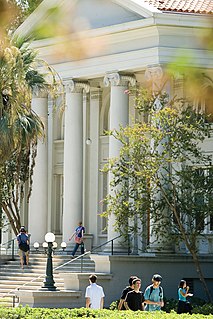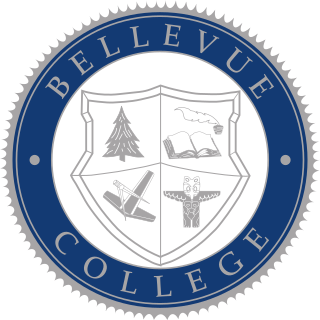The New Jersey Commission on Higher Education is a government agency in New Jersey that is responsible for providing coordination, planning, policy development, and advocacy for the state's higher education system. The Commission is also responsible for licensing of institutions and the administration of the Educational Opportunity Fund.
It was established by the Higher Education Restructuring Act of 1994.
The Commission serves as the principal advocate for an integrated system of higher education which provides a broad scope of higher education programs and services. The system includes both public and independent institutions and enrolls over 380,000 full-time and part-time credit-seeking students statewide. The 31 public colleges and universities are Rutgers, The State University of New Jersey; the University of Medicine and Dentistry of New Jersey; the New Jersey Institute of Technology; four state colleges and five state universities; and 19 county colleges. The 26 independent institutions include 14 non-profit senior colleges and universities with a public mission: Princeton University, Fairleigh Dickinson University, Seton Hall University, Stevens Institute of Technology, Rider, Georgian Court, Drew, Caldwell College, Bloomfield College, Felician, St. Peter's University, Centenary, Monmouth, and the College of St. Elizabeth, as well as two independent two-year religious colleges, eight rabbinical schools and theological seminaries, both Catholic and Protestant, and four proprietary institutions with degree-granting authority.

A college is an educational institution or a constituent part of one. A college may be a degree-awarding tertiary educational institution, a part of a collegiate or federal university, an institution offering vocational education, or a secondary school.

Vocational education is education that prepares people to work as a technician or to take up employment in a skilled craft or trade as a tradesperson or artisan. Vocational Education can also be seen as that type of education given to an individual to prepare that individual to be gainfully employed or self employed with requisite skill. Vocational education is known by a variety of names, depending on the country concerned, including career and technical education, or acronyms such as TVET and TAFE.

Undergraduate education is education conducted after secondary education and before postgraduate education. It typically includes all postsecondary programs up to the level of a bachelor's degree. For example, in the United States, an entry-level university student is known as an undergraduate, while students of higher degrees are known as graduate students. Upon completion of a number of required and elective courses as part of an undergraduate program, the student would earn the corresponding degree. In some other educational systems, undergraduate education is postsecondary education up to the level of a master's degree; this is the case for some science courses in Britain and some medicine courses in Europe.

Third-level education in the Republic of Ireland includes all education after second-level, encompassing higher education in universities and colleges and further education on Post Leaving Certificate (PLC) and other courses. The degree-awarding institutions which can grant awards at all academic levels are the University of Dublin, National University of Ireland, University of Limerick, Dublin City University, Technological University Dublin, the Royal College of Surgeons in Ireland, Munster Technological University and Technological University of the Shannon: Midlands Midwest, as well as St. Patrick's College, Maynooth, and then a State agency, Quality and Qualifications Ireland, can grant awards in other institutions directly, or delegate the authority to do so. and University of Limerick. The King's Inns of Dublin has a limited role in education specialising in the preparation of candidates for the degree of barrister-at-law to practice as barristers. Medical schools in Ireland also have particular regulation. There were seven establishments of higher education within Ireland ranked among the top 500 universities worldwide by the Times Higher Education Supplement in 2008.
An institute of technology is an institution of tertiary education that specializes in engineering, technology, applied science, and natural sciences.
A provost is the senior academic administrator at many institutions of higher education in the United States and Canada and the equivalent of a deputy vice-chancellor at some institutions in the United Kingdom, Ireland, and Australia. Additionally, the heads of certain colleges of universities in the UK and Ireland are called provosts; the term is, used in this sense, the equivalent of a Master or Principal at other colleges.

A public university or public college is a university or college that is in state ownership or receives significant public funds through a national or subnational government, as opposed to a private university. Whether a national university is considered public varies from one country to another, largely depending on the specific education landscape.

Private universities and private colleges are institutions of higher education, not operated, owned, or institutionally funded by governments. They may and often do receive from governments tax breaks, public student loans, and grants. Depending on their location, private universities may be subject to government regulation. Private universities may be contrasted with public universities and national universities. Many private universities are nonprofit organizations.

Hudson County Community College (HCCC) is a public community college in Hudson County, New Jersey.

Bellevue College (BC) is a public college in Bellevue, Washington, United States. It is the largest of the 34 institutions that make up the Washington Community and Technical Colleges system and the third-largest institution of higher education overall in the state.
A university system is a set of multiple affiliated universities and colleges that are usually geographically distributed. Typically, all member universities in a university system share a common component among all of their various names. Usually, all member universities of a university system are governed by a system-wide governing body, such as a board of trustees or a board of regents. In the United States, many states have one or two state university systems under which many of their publicly funded universities are aligned, both in name and in governance. Additionally, for-profit universities, such as DeVry University, often have multiple campuses which share the same name; these may be, but are not always, described as a university system.

The Oklahoma State Regents for Higher Education is the agency of the government of Oklahoma that serves as the governing body of the Oklahoma State System of Higher Education, which is the largest provider of higher education in the state of Oklahoma. The State System consists of all institutions of higher education in Oklahoma that are supported by direct legislative appropriations from the Oklahoma Legislature.

The state of Uttar Pradesh had a small tradition of learning, although it had remained mostly confined to the elite class and the religious establishment.

The Ministry of Education is a ministry of the Government of India, responsible for the implementation of the National Policy on Education. The Ministry is further divided into two departments: the Department of School Education and Literacy, which deals with primary, secondary and higher secondary education, adult education and literacy, and the Department of Higher Education, which deals with university level education, technical education, scholarships, etc.
Higher education accreditation is a type of quality assurance process under which services and operations of post-secondary educational institutions or programs are evaluated to determine if applicable standards are met. If standards are met, accredited status is granted by the agency.

India has a publicly funded higher education system that is the third largest in the world, next to the United States and China. The main governing body at the tertiary level is the University Grants Commission, which enforces its standards, advises the government, and helps coordinate between the centre and the state. Accreditation for higher learning is overseen by 15 autonomous institutions established by the University Grants Commission (UGC).